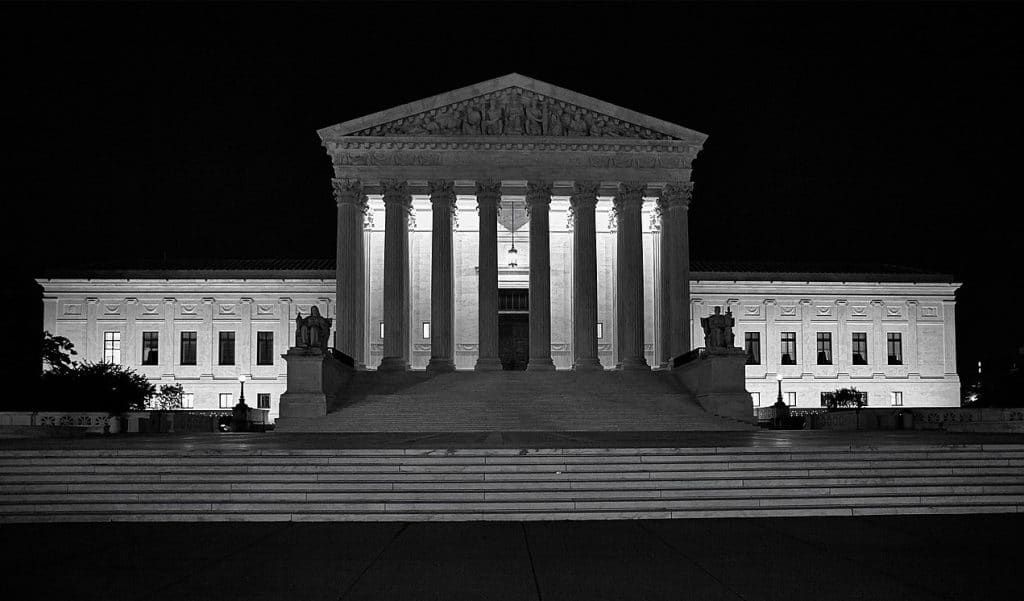The Supreme Court’s EPA decision heralds a broad assault on democracy
By Adam Sobel | July 1, 2022
 The US Supreme Court building. Credit: Wikimedia Commons.
The US Supreme Court building. Credit: Wikimedia Commons.
“The Court appoints itself — instead of Congress or the expert agency — the decision maker on climate policy. I cannot think of many things more frightening.” Justice Elena Kagan wrote that, in her dissent from the Supreme Court majority’s ruling in West Virginia v Environmental Protection Agency. I agree—but I can easily think of a few things that are about equally frightening. Namely, the Supreme Court decisions that immediately preceded it, and the ones that are likely to come soon after.
In the EPA ruling, the court’s majority argued that the Clean Air Act didn’t give the EPA the authority to make broad regulations limiting greenhouse gas emissions from power plants. Only Congress has that power, they argued. The court acknowledged that modern life is sufficiently complex that the historical practice, in which Congress makes laws expressing broad intent and federal agencies work out the details required to implement them, is to some extent necessary in our complex modern age but ruled that it isn’t enough in the case of “major questions.” This is apparently a new legal theory, just invented to justify the court’s decision.
If one wants to see an upside, the ruling is not as broad as those of us who want a functioning government had feared. Because it affects only a specific EPA rule, it doesn’t yet invalidate the entire “administrative state” that, in practice, allows the United States to exist as a modern country, and that gives citizens some protection from corporate power.
But the ruling puts everyone on notice. Anything any federal agency does that the new far-right majority on the court doesn’t like can apparently be declared a “major question,” so that no action can be taken by the agency unless Congress explicitly approves the specific rule in question—even when (as in the case of the Clean Air Act) Congress has already instructed the Agency to implement a law with clear intent.
Of course, as the majority knows, the US Congress—with its gerrymandered House and unrepresentative, filibuster-bound Senate—is too dysfunctional to do almost anything. So this decision threatens us all with the prospect of a nation ruled by the unchecked profit motives of large corporations and the ultra-wealthy, those in the fossil fuel industry first among them.
How bad, specifically, is the ruling for the climate? It’s not good. But it certainly doesn’t end the energy transition, either. It still allows the EPA some leverage to regulate emissions. States and cities can continue to act on their own, and the private sector can keep pushing forward as renewables continue to drop in price. But the decision takes away what was arguably—given the near-certainty of congressional inaction—the broad regulatory authority over power plant carbon emissions that is the federal government’s most important tool for reducing the rate at which we’re putting greenhouse gases into the atmosphere.
This decision has made me feel a toxic stew of negative emotions; high among them is shame. Until relatively recently, the United States was the highest carbon-emitting nation, and its cumulative emissions to date—the metric that matters most about changing the climate—still beat any other country’s by a long shot. US emissions per capita remain substantially higher than those of any other country of comparable size. And for most of the history of international climate negotiations, the United States has thrown wrenches in the gears, when we should have been leading efforts to limit climate change. Those Americans who understand the gravity of the climate problem have long been unable to defend the actions of their national government (the Paris Agreement under Obama being the main exception). This decision locks that dismal situation in, maybe for a long time to come, while time is rapidly running out to take action that would avert dangerous levels of global warming.
The larger situation is even grimmer, when one also considers the other Supreme Court rulings rendered in the last couple weeks. These include the distressing rulings on gun laws and indigenous rights. But most of all, with the overturning of Roe v Wade, the court rolled back a human right that Americans—not just women, all of us—had come to take for granted over the last 50 years. And with the announcement that the court will hear Moore v. Harper, a test of the “independent state legislature” theory, the majority now threatens to give gerrymandered state legislatures complete control over elections, threatening US democracy to the core.
Are those other decisions scarier or less scary than West Virginia v EPA? I don’t know, and it doesn’t matter. They’re all connected. A future United States in which the Republican Party holds complete power, unfettered by free and fair elections, is not one in which human rights or the climate will do well. But such a future seems much likelier than most of us could have imagined, at least before 2016.
This dystopian vision is not a given, yet. But as someone who studies natural disasters, one thing I know is that human beings, individually and collectively, almost inevitably under- rather than overestimate the risks of disasters that they’ve never experienced. This tendency makes humans less able to act in a timely manner to prevent the worst outcomes. If Americans are going to do whatever they can to prevent the worst from happening on climate—and on all the other fronts where we’ve historically been able to take some semblance of functioning democratic governance for granted—they need to understand the gravity of the situation. The potential, eventual harm the United States faces is greater, even, than what these recent Supreme Court decisions, awful as they are, will cause.
Together, we make the world safer.
The Bulletin elevates expert voices above the noise. But as an independent nonprofit organization, our operations depend on the support of readers like you. Help us continue to deliver quality journalism that holds leaders accountable. Your support of our work at any level is important. In return, we promise our coverage will be understandable, influential, vigilant, solution-oriented, and fair-minded. Together we can make a difference.
Keywords: 2024 election, Roe v Wade, Supreme Court, West Virginia v EPA, administrative state, climate change, democracy, major questions
Topics: Analysis, Climate Change, Opinion















